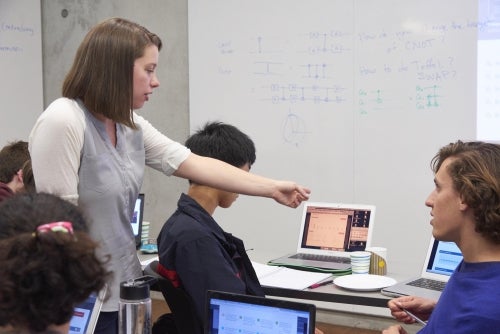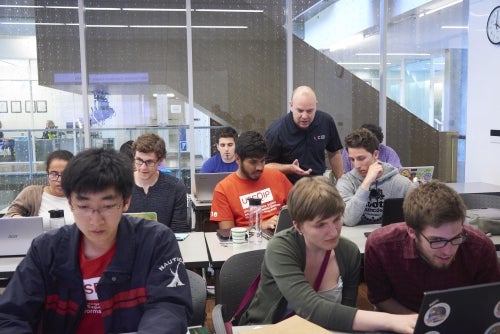IBM Quantum Experience is used for the first time as an educational tool at IQC’s Undergraduate School for Experimental Quantum Information Processing (USEQIP).
On Tuesday, June 7, 24 students attending USEQIP at the Institute for Quantum Computing (IQC) used the IBM Quantum Experience to test algorithms that they were learning about in the classroom. Former IQC PhD student, Dr. Sarah Sheldon, now a research staff member at the IBM T.J. Watson Research Center, introduced the students to the platform, assisted them in working through examples and described the inner workings of IBM’s quantum processor.
Sheldon’s former supervisor, David Cory, Canada Excellence Chair in Quantum Information Processing and a professor in the Department of Chemistry at the University of Waterloo, had prepared the USEQIP students on June 1 for their time with Sheldon. He described the operation of the IBM processor and went through how to program it, including an example of entanglement assisted metrology.
After working through a tutorial, students quickly ran a Deutsch algorithm. The algorithm is one of the simplest quantum algorithms – it requires fewer queries than a classical computer. Students were excited to see the algorithm physically work. They continued to run additional algorithms for quantum error correction, quantum teleportation, as well as others.
Once they were done their experiments, the students worked in groups to complete reports for IBM. The reports included a brief description of the student project project, why it was interesting, descriptions of the circuits and gates, the expected outcomes and the actual output and conclusions.
“At IBM, we are interested in using IBM Quantum Experience as an educational tool to engage with students and get them to learn more about it,” said Sheldon. “USEQIP is a really great program for getting started with quantum information, so we’re happy to come try it out here for the first time.”

Sarah Sheldon, IBM research staff member, helps USEQIP students run their experiments on the IBM Quantum Experience platform.
As part of the team working on the IBM Quantum Experience, Sheldon’s research focuses on quantum control by improving one- and two-qubit gates to achieve higher and higher fidelity. IBM opened access to the world’s first quantum cloud computing platform, IBM Quantum Experience, to students, researchers and general science enthusiasts on May 4, 2016. The platform allows users to run experiments on IBM’s quantum processor from any desktop or mobile device. The five-qubit processor is housed at the IBM T.J. Watson Research Center in New York.
“Five qubits doesn’t seem like a lot, but in terms of what quantum computers can do now, at a fault tolerant level, five qubits is a lot,” explained Emily Tyhurst, a USEQIP student from the University of British Columbia. “To have the opportunity to access a quantum computer as an undergraduate is really, extremely exciting.”

Students, including Emily Tyhurst (centre front), work in groups to run their experiments.